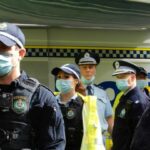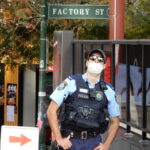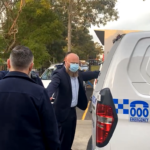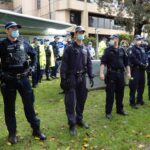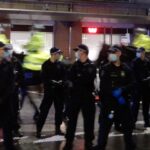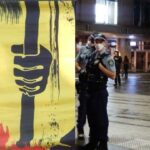“A Highly Politicised Use of Police”: Shoebridge on COVID Policing, Quotas and Drug Dogs
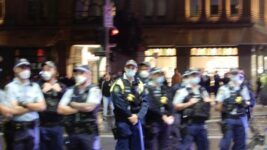
The NSW Police Force has dropped its controversial policy of providing each area command across the state with a set of personal search and move-on order targets that officers were expected to meet over a financial year.
The quotas, or “community safety indicators”, were dropped for 2021-22.
According to the Herald, despite crime rates having decreased over the two years prior and the onset of the pandemic, search and move-on targets were increased for the year 2020-21, which explains why so many people stopped by officers for COVID reasons were subsequently searched.
MLC David Shoebridge revealed that officers in this state were “policing by numbers” in late 2019. The NSW Greens justice spokesperson criticised the strategy as opening the way for “serious abuse”, as officers struggling to meet quotas might bend protocols to add another search to their tally.
Shoebridge also suggested that while the quotas related to general searches, it was likely they were one of the reasons for a steep rise in the use of strip searches by NSW police over the last half decade, which saw a 47 percent increase for the four years to June 2018.
Policing biosecurity
NSW police has played a much broader role in daily life since COVID-19 arrived. Indeed, then premier Gladys Berejiklian placed NSW police commissioner Mick Fuller in charge of the state’s entire public health response in early 2020.
This commenced with officers sweeping the streets, handing out thousands of steep fines to those outside of their homes without an excuse in a myriad of absurd circumstances. It also exacerbated the usual policing disparities with First Nations people being overrepresented in those sanctioned.
As the second Delta wave of COVID hit the city in mid-2021 and cases began to rise in southwestern Sydney, NSW police conducted a high visibility operation in the region, sending in extra troops, imposing a curfew, and eventually calling on the army to assist.
By September last year, Fuller told a budget estimates hearing that his officers were “treating the virus like a criminal”, and he even advised them if they misapplied the law in relation to COVID policing, they’d be excused.
Drug dogs are back
Those days are now gone. New NSW premier Dominic Perrottet has let the virus rip through the community, and NSW police has gotten back to its old job of hassling civilians with sniffer dogs and strip searches, as was evidenced at the recent Field Day festival.
Over the last ten years, Shoebridge and the NSW Young Greens have been advocating for an end to the warrantless use of drug dogs in public places via the campaign Sniff Off. And they’ve also been calling for serious reforms around the overuse and the misuse of strip searches.
Sydney Criminal Lawyers spoke to NSW Greens MLC David Shoebridge about the impact the last two years of COVID policing has had on the community, the removal of the quota system he helped expose, and why NSW police should ditch the dogs.
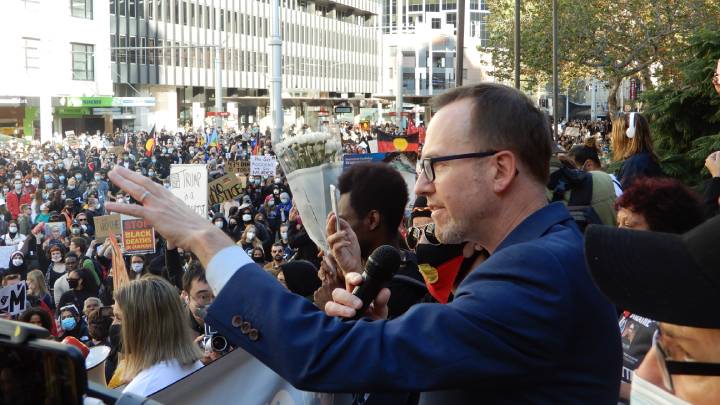
In another bizarre twist to COVID policing, as the NSW premier established the requirement for the public to record rapid antigen test results last week, he further imposed a $1,000 fine for failure to report a positive result.
The government has admitted this sanction is unenforceable. So, David, are there issues with the government rolling out this draconian penalty that serves no on-the-ground purpose?
This is a continuation of the government’s idea that they can police their way through a pandemic.
Not only is it unenforceable, but it actually creates a further barrier between the ordinary public and what should be a collective public health response to a pandemic.
I’ve had multiple people contact my office and say they and their peers don’t want to be any part of a system that’s based upon punishment and police, rather than a collective public health response.
There are very real concerns that this is why we’re getting such low reporting of RAT results.
The last two years have seen a dramatic upscaling of the presence NSW police play in citizens’ everyday lives with the onset of COVID policing. You’ve been a critic of this heavy-handed approach to the pandemic.
What sort of impact has this sustained operation had on the community?
There is no doubt that it has widened the gap between the NSW police and, particularly, communities in western Sydney, multicultural communities and First Nations communities.
You would have to be deliberately ignorant to not realise how close the relationship between policing and poverty has been. And that’s a highly politicised use of police.
We have at all times been concerned that this ramping up of the police role in society may take a generation or more to ramp back down again.
There is no evidence that the NSW police want to step back their role in our daily lives.
So, given that, what could have been an alternative to putting the police commissioner in charge of the COVID response, with officers being the frontline enforcers of health measures?
The obvious alternative to police was to have the public health authorities control managing the pandemic and the interactions between the public and the state.
Ultimately, what has worked over the course of this pandemic hasn’t been the threats and the arrests and prosecutions, but it’s been the willingness of the communities to get on board with public health measures: to voluntarily be vaccinated, to voluntarily wear a mask.
Last week, it came to light that NSW police has dropped its controversial system of requiring officers to meet search and move-on order quotas. You exposed this policy to the wider public.
The commissioner stated it’s been dropped due to the “prevention-focused policing” around COVID.
Why was this system problematic?
This was a system designed to abuse people’s human rights. When people are being stopped and searched because they’re vulnerable, they’re less likely to complain, and they will meet the police’s obscene quotas.
You have a system that is actually designed to abuse the most vulnerable in society, and that’s what we saw.
We saw First Nations communities and multicultural communities bearing the brunt of a policing by numbers approach.
I don’t mind the excuse the police have used to scrap it. I’m just glad it has been scrapped.
What I found extraordinary about it was we were the only political party calling for it to end, but we had 90 percent of the community behind us.
As I said, I don’t mind what excuse they use to scrap it, I’m just glad it’s in the dustbin.
While quotas have been dropped, the widespread use of strip searches has not. And despite a strong campaign calling for reforms around the practice, no substantial changes have occurred.
Why is NSW police so stuck on increasing the use of this procedure when for the most part it doesn’t achieve its stated aim?
The notional aim of strip searches is to discover illegal drugs and, potentially, in a tiny minority of cases, illegal weapons. That is the pretence the police have in their police documents.
But the political purpose of strip searches and aggressive personal searches is quite different. The political purpose is to satisfy an ideological bent inside the NSW police, which is a commitment to proactive policing.
It’s to be in citizens’ faces. It’s the aggressive presence of police, as a notional deterrent to crime. This is a discredited policing policy that first started in New York.
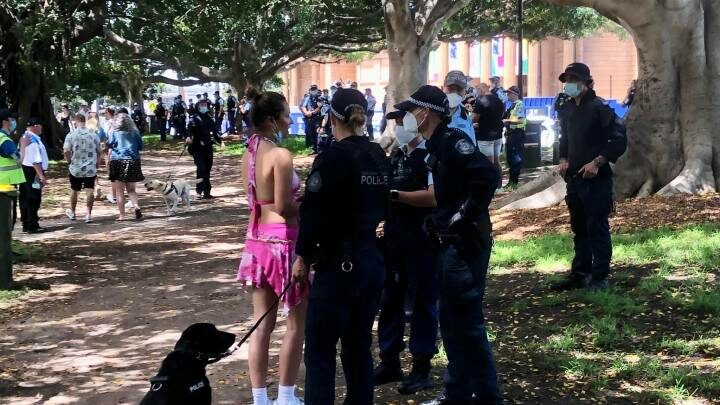
And lastly, on New Year’s Day, NSW police unleashed saturation policing with accompanying sniffer dogs at Field Day, which was one of the first music festivals since the lockdown ended.
At the event, officers arrested 85 people, with 82 of these arrests due to the detection of a small amount of drugs for personal use.
Does the community really need these sorts of operations to be rolled out again, especially as the pandemic continues to rage?
We have seen recommendations from the NSW Coroner that these aggressive policing practices at music festivals should end, because we know, in fact, they make people less safe.
They’re likely to cause riskier drug-taking behaviour, such as pre-loading. They’re more likely to see people sourcing drugs in the festival from unknown suppliers.
And they put increased barriers, especially for young people, to getting assistance from police, when they or a friend get into strife at a festival.
We know it doesn’t make people safer, and we know it doesn’t stop drugs getting into the music festival.
Again, it’s about the ideology of the police force, and it’s much more to do with PR than it is to do with enforcing drug laws or keeping young people safe.
Despite the 85 arrests, no one would pretend that there was an absence of drugs at that music festival or any other music festival. It simply does not work.
The operation was a real slap in the face for young people and for the music festival: to start 2022 with a throwback to the worst policing that we saw in 2020 and before.
Many people just shook their heads and said, “How can the police continue to get it so wrong.”


